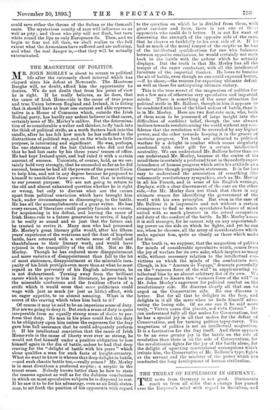TOPICS OF THE DAY.
THE POSSIBLE EXTIRPATION OF THE ARMENIANS. -ENGLISFIMEN have a great difficulty in believing that the dominant party in Yildiz Kiosk intend, or at least intended till Europe interfered, the total destruc- tion of the Armenian people. It is impossible, they say, to kill out a nation, even if it only numbers a million ; no one, they secretly think, would be wicked enough to make such an attempt, and they never give up the hope that the Armenians, driven to despair, would defend themselves as Montenegrins do. The first argument has, if by extirpa- tion you mean wholesale slaughter, something to be said for it. It is nearly impossible to kill all the people of any race which has once become civilised enough to be aware of its danger, for the people either fight, and in defensible places win the battle, or they fly, and, after incredible hardships, some survive. It is not quite impossible, for Genseric and his Vandals probably did kill out the whole civilised populaticns of Northern Africa, and the Arabs must have killed more than one or even two millions of the older population of Egypt, but still extirpation in its literal sense is an extremely difficult work, and, except in the cases quoted, has probably never been carried out in the literal meaning of the word, the one apparent case, the total disappearance of the highly civilised Cambodians, having probably been due either to a. long-continued drought, or to an outburst of malarial disease, such as emptied and desolated for ever the splendid city of Gour, the old capital of Bengal, whose sculptured ruins still occupy square miles of soil. If, however, by extirpation the speaker means destruction as a people, thus in- cluding dispersion as well as slaughter in his survey, the impossibility disappears. The Saxons probably " de- stroyed " the Britons in that fashion ; and Titus, the " delight of the world," certainly in that fashion " ex- tirpated " the Jews, who never again became a people, or attempted to cultivate the soil of their own land. The Spaniards, in that sense, " extirpated " the Moors, who had risen to a high civilisation, the few who remained in the Peninsula being absorbed in the white popu- lation, especially in Algarve, the southern province of Portugal, and disappearing finally from human ken. It would not only be possible, but easy, for the Ottomans to destroy the Armenian people in this way, for a third of them at least are scattered through the Empire, and can be massacred in detail, and the remaining two-thirds, if sufficiently persecuted and slaughtered, would fly, as the whole upper class is flying, into Russia. They were great soldiers once, but they are not fighters now ; they are as visible among Mussulmans as goats among oxen ; they have no arms, and their efforts at self-defence are as futile against weapons of precision as those of the fighting Aztecs against Cortez's mail-clad cavalry. The operation would not take two spring seasons ; after which the relics of the Armenian people would be wanderers ,perhaps for ever, over earth, or perhaps, being Christians and full of industrial capacity, would be absorbed among the multitudes who now populate Southern Europe. It is, as we conceive, quite one of the chances of the present day that the ancient Armenian people, who are as Aryan as the ancient Persians or ourselves, may pass from the face of earth, dying finally of Turkish violence and European betrayal.
The second reason for doubting the occurrence of such a calamity, the impossibility of believing that any one should form such a design as extirpation, has no founda- tion whatever. There is no reason for believing that Titus was a worse man than Abd-ul-Hamid ; and he carried out to its logical conclusion towards the Jews precisely the policy which the Sultan is carrying out towards the Armenians. Ferdinand of Aragon was in no way worse than most Princes of his time, and he relentlessly carried out the expulsion of the Moors. Philip II. procured a decree from the Inquisition sen- tencing to death the whole Protestant population of the Netherlands. He was probably a specially bad man, but Louis XIV. was not, and he treated his Protestant sub- jects precisely as the Sultan is now treating the Armenians. Even in our own time a great Christian Sovereign has begun the expulsioia of three millions of Jews, and only this week two orators in the Austrian Parliament de- manded the deportation of the same race in tones which indicated that if the work were accomplished by mob violence—which would involve massacre—they at least would not be displeased. There is no reason why a Sultan should be more merciful than these men, and one strong reason why he should not. He probably shares to the full the impression of his Mahommedan subjects, that the Armenians are guilty of treason, and have become a danger to Islam. He knows, it is true, that they do not rise in insurrection, but he believes that they are appealing to the foreigner, and that it is in con- sequence of their hostility that European squadrons are gathering in menace on his coasts. Cinder those circumstances he, as Khalif, is not only entitled to "restore order," but is bound to do it, and may very easily, as Mahommedan and as Turk, believe as Titus believed, that the interest of the Faith or of the Empire requires a policy of extirpation. That those around him believe this is patent on the face of things, and it is pro- bable that the ordinary Ottomans believe it too, for they have the instinct of a dominant caste, they see how Armenians hate them, and they know that whenever they are threatened, their Christian subjects appeal to Europe with more or less success That the Armenians are com- paratively rich and pleasant to plunder is true too, as a cor- respondent of the Times argued on Tuesday ; but the grand motive of the massacres is not greed, but hatred, hatred like that of Ferdinand for Moors, Louis XIV, for Huguenots, or Dr. Lueger for Jews. There is no hope for Armenians in the second argument ; and none in the final one that they can resist. They cannot resist effectually. Englishmen could not, if they were disarmed, undrilled, and surrounded at once by a regular and most formidable soldiery, and by a hostile and well-armed mob. You might as well expect the Jews to resist in Russia, or the gipsies in Roumania, or the Catholics in Great Britain. They have not the means to resist, and if they do, they are only crushed more completely and more quickly, for though the Regulars do not interfere at first, they will not stand by and see their co-religionists defeated by men whom they regard as "risen" and ungrateful slaves. The Americans would not assist blacks against whites in a local riot, and the hatred of the Turk for a Christian subject who disobeys is deeper than the hatred of an American for an " insolent " black, for he thinks he is justified by his creed, which the American does not, and he has a fear that his opponents may find foreign protection, from which the American is exempt. In plain English, the Armenian, having once aroused Otto- man jealousy as well as hate, must either be protected from the outside, or he will perish.
Our people will understand the whole situation if the Macedonians should rise in insurrection, and be put down as the Armenians are being "put down." The sympathy of Europeans and Asiatics is so imperfect, that even the modern passion of pity grows cold when the victims belong to the latter continent. The Japanese massacre of the Chinese in Port Arthur hardly stirred Europe more than a great railway disaster would have done. The great perse- cution of the Jews in Russia was no doubt condemned, especially by religious persons, but it woke none of the passionate feeling aroused two centuries before by the cruelties inflicted on the Huguenots of France. Not only were the flying Hebrews not welcomed here as the Huguenots, who were fed, comforted, and subsidised, but the mass of the population objected to their coming, sulkily declaring that Russian Jews were a dirty lot, and would bring down the general rate of wages. Even for these Armenians, though the existence of treaties and a general horror of Turks wakes in this country a cer- tain energy of denunciation, the general sympathy is imperfect, the subscriptions for the ruined come in in driblets, and many of the journals are willing to believe not only that Armenians are disagreeable folk—which is true enough of classes among them, they often displaying the Asiatic tendency to insolence in prosperity—but that they are capable of rising volun- tarily upon Mussulmans, which is like saying that the Jews of our East-End are capable of organising a re- volt. The Macedonians, on the other hand, are as European as we are. Every blow struck will be realised all through Europe ; and if the Macedonian women are treated as Armenian women have been treated, nothing could save either the throne of the Sultan or the Osmanli caste. The mysterious comity of race will influence us as well as pity ; and those who pity will not flush, but turn white round the lips as only Europeans do. Then, and we begin to fear not till then, we shall realise to the full extent what the Armenians have suffered and are suffering, and what the real danger is,—that they will be actually exterminated.











































 Previous page
Previous page